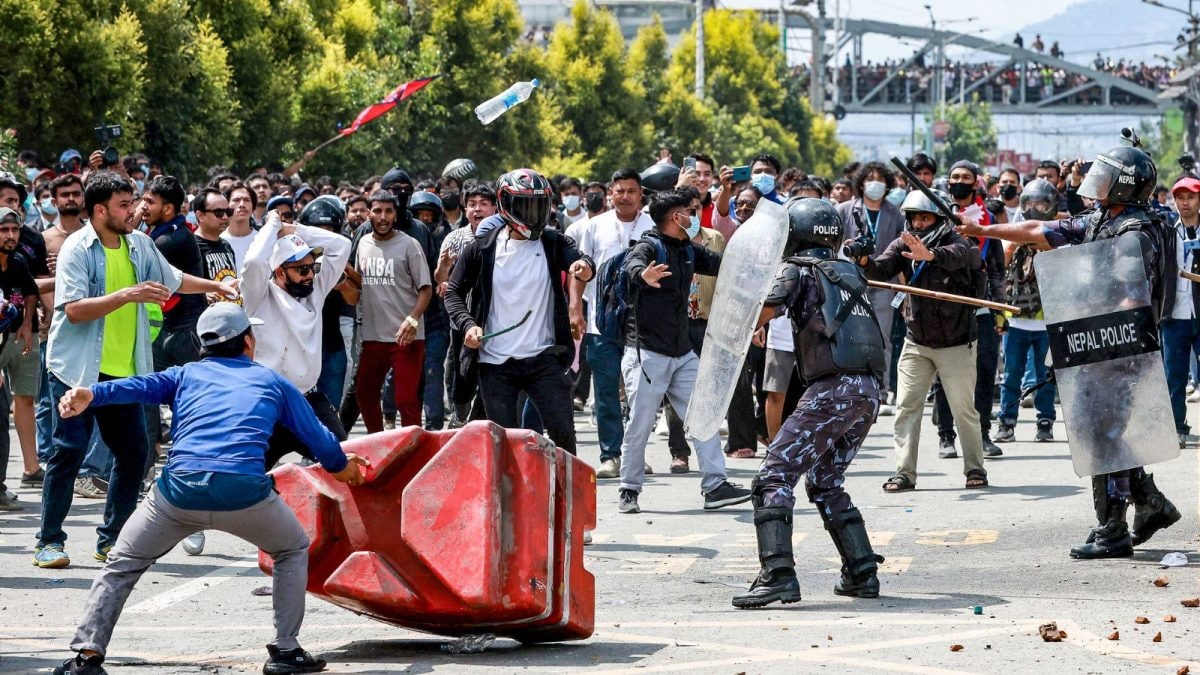Last Updated:
Nepal is not the only country experiencing turbulent times. Several foreign governments have faced major crises, with many prime ministers or heads of government resigning

Demonstrators weild stones and sticks as they clash with riot police personnel during a protest outside the Parliament in Kathmandu. (AFP)
Nepal is witnessing a major political crisis after the resignation of Prime Minister KP Sharma Oli in the wake of massive protests against corruption and the now-revoked social media ban.
The protests, which began on Monday, spread across Nepal, and demonstrators went on a rampage today, setting fire to the houses of ministers and government buildings.
Recommended Stories
Finance Minister Bishnu Prasad Paudel was chased on a road and beaten by demonstrators. At least three ministers in Oli’s cabinet have also resigned so far.
However, Nepal is not the only country experiencing turbulent times this year. From Japan to France, several foreign governments have faced major crises, with many prime ministers or heads of government resigning.
Here’s A List Of Countries Which Witnessed Major Political Crisis
France: French Prime Minister Francois Bayrou resigned from his post on September 9 after losing a confidence vote. Bayrou had blindsided even his allies by calling a confidence vote to end a lengthy standoff over his austerity budget, which foresaw almost 44 billion euros ($52 billion) in cost savings to reduce France’s debt pile.
Bayrou was the sixth prime minister under Macron since his 2017 election, and the fifth since 2022. His predecessor, Michel Barnier, was brought down by a no-confidence vote in December, and the crisis dates back to the summer 2024 legislative elections that resulted in a hung parliament.
Mongolia: Mongolia witnessed massive protests against then-Prime Minister Oyun-Erdene Luvsannamsrai earlier this year after reports of lavish spending by his son. Luvsannamsrai lost a confidence vote in Parliament and later resigned from his post. Zandanshatar Gombojav from Luvsannamsrai’s Mongolian People’s Party (MPP) later took over as Prime Minister.
Serbia: Serbia faced a political crisis in March when Prime Minister Milos Vucevic resigned from his post. Vucevic was under pressure due to protests after a roof collapse at a train station in Novi Sad, which killed 16 people last year. Djuro Macu of the Serbian Progressive Party (SNS) replaced Vucevic as Prime Minister in April.
Indonesia: Indonesia witnessed violent protests over low wages, unemployment, and perks for lawmakers. The protests prompted Indonesia’s President Prabowo Subianto to reshuffle the cabinet, replacing five ministers, including Finance Minister Sri Mulyani Indrawati, who once served as managing director of the World Bank and served under three different presidents. Indrawati’s house was ransacked during the recent protests over lavish perks for lawmakers.
Netherlands: The Netherlands government collapsed after far-right politician Geert Wilders exited the right-wing coalition. Wilders ran into a dispute with PM Dick Schoof over anti-immigration measures. Following Schoof’s resignation, the country is under a caretaker government, and an election has been scheduled for October 29, 2025.
Romania: President Klaus Iohannis resigned from his post earlier in February this year after the country’s Supreme Court annulled the presidential election. Nicușor Dan, the independent mayor of Bucharest, replaced Iohannis as interim president.
Thailand: Last month, Thailand’s Constitutional Court, in an unprecedented ruling, removed suspended Prime Minister Paetongtarn Shinawatra from office, ruling that she engaged in ethical misconduct during a controversial phone call with former Cambodian leader Hun Sen. This is the fifth instance in Thailand’s history where prime ministers were stripped of office by judges since 2008. Business tycoon and veteran politician Anutin Charnvirakul has replaced Paetongtarn Shinawatra as Prime Minister.
Japan: Japan’s Prime Minister Shigeru Ishiba has said he would step down after less than a year in power, during which he lost his majority in both houses of parliament. Ishiba told a news conference that the long-dominant Liberal Democratic Party (LDP) should prepare for a leadership election, and he would stay in position until then. Opponents of Ishiba had been calling for him to step down to take responsibility for poor election results following the party’s weak performance in an upper chamber vote in July. Lower house elections in October 2024 saw the LDP suffer its worst result in 15 years.
Bangladesh: Bangladesh is being governed by an interim government after the fall of Sheikh Hasina’s regime in August last year. Interim leader Muhammad Yunus, who heads the caretaker government, has announced that fresh elections will be held in 2026. Hasina fled Bangladesh after massive student protests against a civil service jobs quota system.
Pakistan: The world witnessed a de facto coup in Pakistan when PM Shehbaz Sharif promoted Army Chief General Asim Munir to the rank of Field Marshal, making him the second person in Pakistan’s history to hold the prestigious five-star rank and the first to serve as Chief of Army Staff with that rank. During the brief India-Pakistan conflict in May this year, US Secretary of State Marco Rubio spoke with Munir, underlining his importance in Islamabad. Munir also went to Washington to meet US President Donald Trump at the White House. He has been meeting several world leaders, including China’s Xi Jinping, since his promotion.
About the Author

Saurabh Verma covers general, national and international day-to-day news for News18.com as a Senior Sub-editor. He keenly observes politics. You can follow him on Twitter –twitter.com/saurabhkverma19
Saurabh Verma covers general, national and international day-to-day news for News18.com as a Senior Sub-editor. He keenly observes politics. You can follow him on Twitter –twitter.com/saurabhkverma19
September 09, 2025, 16:46 IST
Loading comments…
Read More




